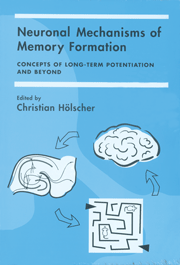Book contents
- Frontmatter
- Contents
- Contributors
- Introduction: Long-Term Potentiation as a Model for Memory Mechanisms: The Story So Far
- Section One Long-Term Potentiation In Vitro and In Vivo: How Can We Fine-Tune the Current Models for Memory Formation?
- Section Two There is More to the Picture Than Long-Term Potentiation: Theta or Gamma Oscillations in the Brain and the Facilitation of Synaptic Plasticity
- Section Three Making Models from Empirical Data of Synaptic Plasticity
- Section Four Setting the Stage for Memory Formation: Stress, Arousal, and Attention
- 13 Strategies for Studying the Role of LTP in Spatial Learning: What Do We Know? Where Should We Go?
- 14 What Studies in Old Rats Tell Us about the Role of LTP in Learning and Memory
- 15 Implications of the Neuropsychology of Anxiety for the Functional Role of LTP in the Hippocampus
- 16 Differential Effects of Stress on Hippocampal and Amygdaloid LTP: Insight Into the Neurobiology of Traumatic Memories
- Section Five Transgenic Mice as Tools to Unravel the Mechanisms of Memory Formation
- Conclusions and Future Targets
- Index
15 - Implications of the Neuropsychology of Anxiety for the Functional Role of LTP in the Hippocampus
Published online by Cambridge University Press: 13 October 2009
- Frontmatter
- Contents
- Contributors
- Introduction: Long-Term Potentiation as a Model for Memory Mechanisms: The Story So Far
- Section One Long-Term Potentiation In Vitro and In Vivo: How Can We Fine-Tune the Current Models for Memory Formation?
- Section Two There is More to the Picture Than Long-Term Potentiation: Theta or Gamma Oscillations in the Brain and the Facilitation of Synaptic Plasticity
- Section Three Making Models from Empirical Data of Synaptic Plasticity
- Section Four Setting the Stage for Memory Formation: Stress, Arousal, and Attention
- 13 Strategies for Studying the Role of LTP in Spatial Learning: What Do We Know? Where Should We Go?
- 14 What Studies in Old Rats Tell Us about the Role of LTP in Learning and Memory
- 15 Implications of the Neuropsychology of Anxiety for the Functional Role of LTP in the Hippocampus
- 16 Differential Effects of Stress on Hippocampal and Amygdaloid LTP: Insight Into the Neurobiology of Traumatic Memories
- Section Five Transgenic Mice as Tools to Unravel the Mechanisms of Memory Formation
- Conclusions and Future Targets
- Index
Summary
SUMMARY
Amnesics and hippocampally lesioned animals fail to suppress incorrect information rather than failing to store correct information. There is also strong evidence that anxiolytic drugs act on a behavioral inhibition system involving the hippocampus. This has led to a theory of the neuropsychology of anxiety (Gray and McNaughton, 2000) that has as a corollary, the view that all memories are stored outside the hippocampus. It follows that long-term potentiation (LTP) in the hippocampus cannot be the basis of memory. There is good evidence, however, that LTP is involved in hippocampal function in some way. Our theory would be consistent with hippocampal LTP storing hippocampal-specific data or reprogramming the hippocampal computer. In both cases LTP would be a means of altering the input–output relationships of the hippocampus (and hence indirectly performance on hippocampal-sensitive tasks). If this is true, the hippocampus may often function without the requirement for LTP.
Introduction
In the Introduction to this book, Hölscher notes that the bulk of studies, which see long-term potentiation (LTP) as the substrate for learning and memory, focus on the hippocampus. They manipulate LTP in the hippocampal formation and assess storage of spatial memories. In this chapter I argue that the hippocampus (unlike the cortex or amygdala) does not use LTP to store any type of memory and is not especially concerned with space. Further, I suggest that the hippocampus prevents rather than promotes the formation of connections within the brain. This view derives from a recent update of Gray's (1982) theory of the neuropsychology of anxiety (Gray and McNaughton, 2000).
- Type
- Chapter
- Information
- Neuronal Mechanisms of Memory FormationConcepts of Long-term Potentiation and Beyond, pp. 362 - 378Publisher: Cambridge University PressPrint publication year: 2000



